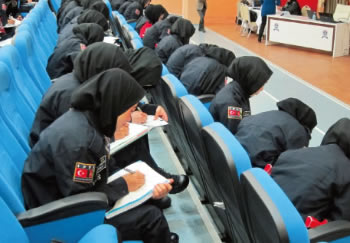ODA Topics 03
Towards the Realization of Gender Equality and Women’s Empowerment
In September 2015 the 2030 Agenda for Sustainable Development (the 2030 Agenda) was adopted at the UN Summit. The 2030 Agenda was adopted to describe the universal goals of the entire international community that both developed and developing countries should achieve together. It comprises 17 Sustainable Development Goals(SDGs)and 169 targets. In the 2030 Agenda, it is strongly and clearly expressed that “Realizing gender equality and the empowerment of women and girls will make a crucial contribution to progress across all the Goals and targets.”
This demonstrates that gender equality and the empowerment of women are major challenges in the field of international cooperation. Various efforts have been implemented to date to improve the environment surrounding women in developing countries. As a result the gender gap between men and women is narrowing in various areas, including education, health and economy. However, there are still many regions around the world where being female places them at the bottom of the social pyramid, limiting access to education and healthcare, and preventing women from leading decent lives.
Women are particularly vulnerable in chaotic conditions such as regions in conflict and it can lead to the spread of gender-based violence, including sexual violence. Women are similarly vulnerable when large-scale natural disasters strike, with many directly facing issues of gender-based violence and lack of access to housing, food and work. In order to prevent such tragic situations from occurring, it is important to develop environments in which women, who best understand their own needs, can regularly participate and take leadership in decision-making processes.
Under the concept that in order to create a vibrant and growing society, it is essential for women to be able to demonstrate their power to the fullest extent, Japan is advancing cooperation with the international community and its assistance to developing countries with the aim of realizing “a society where women shine.” In May 2016, the Government of Japan announced the “Development Strategy for Gender Equality and Women’s Empowerment” as one of the new thematic policies under the Development Cooperation Charter, and presented its plan to train roughly 5,000 female administrative officers and improve learning environments for approximately 50,000 female students over the three years of 2016-2018. Furthermore, at the third World Assembly for Women (WAW!) held in December 2016, Japan announced assistance of a total of more than US$3 billion over the course of three years to 2018 to promote the active participation of women in developing countries. All of this cooperation is being steadily implemented.
Below are some specific examples of Japan’s efforts that seek to build “a society where women shine.”
●Women-friendly infrastructure
Delhi Mass Rapid Transport System Project (India)
In India, harassment and sexual attacks on women in public spaces are recognized as serious problems. A lack of access to safe and comfortable public transportation limits women’s options for schooling and working, and constrains their advancement in society. This project aims to create the “world’s most user-friendly subway” including the adoption of station buildings and facilities and train cars that are considerate to female, elderly and disabled users (such as elevators, escalators and security cameras in stations, and women-only cars and the installation of emergency notification equipment in all cars of trains). Sign language training for station and onboard staff is also being provided.

India: The establishment of safe and secure public transportation leads to the advancement of women in society. (Photo: JICA)
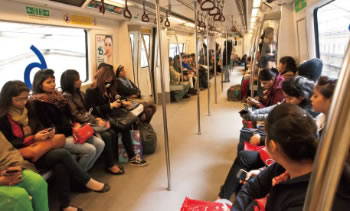
Inside the women-only car of the Delhi Metro (Photo: JICA India Office)
●Improving the learning environment for girls
Project for the construction of secondary schools in Nampula Province (Mozambique)
In Mozambique, an increasing number of students are seeking to advance to secondary education after completing primary education, but due to a lack of classrooms many students are unable to enter a secondary school, so the construction of school facilities is an urgent issue for the country. In this project, Japan provided assistance for the provision of the necessary equipment and materials and for the construction of secondary school classrooms, toilets and sanitation facilities in northern Nampula Province, where the secondary school enrolment rate is low. Constructing safe, secure and sanitary toilet facilities will make it possible for more female students to enroll in secondary education and it is hoped that this will improve the enrolment rate.
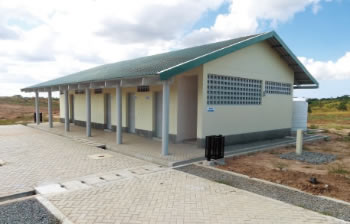
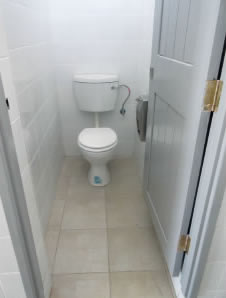
Mozambique: Installing toilets contributes to improve enrollment of girls in secondary education. (Photo: JICA)
●Training of female police officers
Assistance for female police officers in Afghanistan (Afghanistan)
In Afghanistan, gender-based violence, including domestic violence, sexual violence, child marriages and honor killings, present urgent threats to the safety and human rights of women in the country. The Government of Japan has provided assistance for police officers in Afghanistan through contributions to the Law and Order Trust Fund for Afghanistan (LOFTA), which is managed by the United Nations Development Programme (UNDP). In addition, since FY2014 JICA has dispatched individual experts to provide training to female Afghan police officers in Turkey, through programs run by UNDP/LOFTA. In the training implemented in FY2015 a total of 28 mid-career female police officers and 361 newly recruited female police officers participated. Since FY2016, “Training for Afghan policewomen to address gender-based violence” (individual project for technical cooperation) has been implemented in Japan and is scheduled to run for three years.
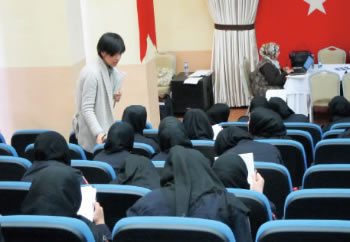
Afghanistan: A JICA international cooperation specialist, Ms. Makiko Kubota, answers questions from trainees. (Photo: JICA)
